On Wednesday I went on a farm visit followed by a film which was to highlight the problem of farm successions. When farmers want to retire there is frequently no one who wants to take over the farm these days. Two hundred small independent farms disappear every week in France, half of them dairy farms. It's not that the farms go out of production, but they get subsumed into larger and larger holdings. The French Ministry of Food and Agriculture has set up various agencies to try to combat the problem and ease the way for generational change on French farms.
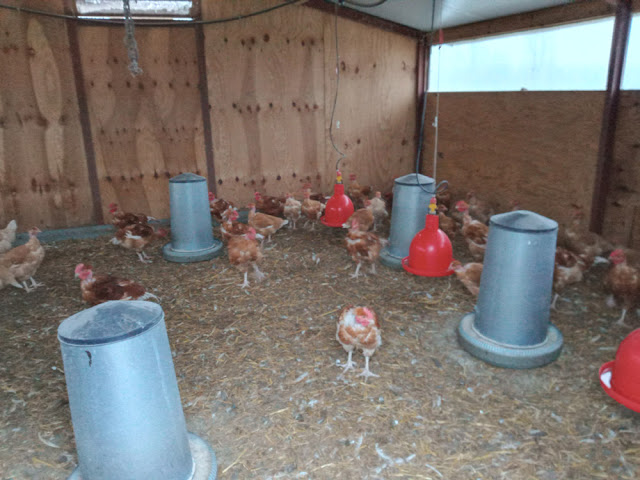 |
| The interior of a poultry shed. Red Naked Neck hens are les poules cou-nu rouge in French, and guinea fowl are les pintades. |
The event started at La Ferme du Sycomore, just outside of Preuilly. It is run by Benoit, who took over from his parents a couple of years ago. He raises poultry (Red Naked Neck hens and guinea fowl) and fattens Charolais heifers for meat on 140 hectares. The poultry is free range, the cattle are shedded in the winter and fed on hay and canola waste. He makes the hay on farm, but the canola supplement is bought in. His parents still live in the farmhouse, so are on hand if he needs some help, but he and his wife, who works off farm, live 30 kilometres away.
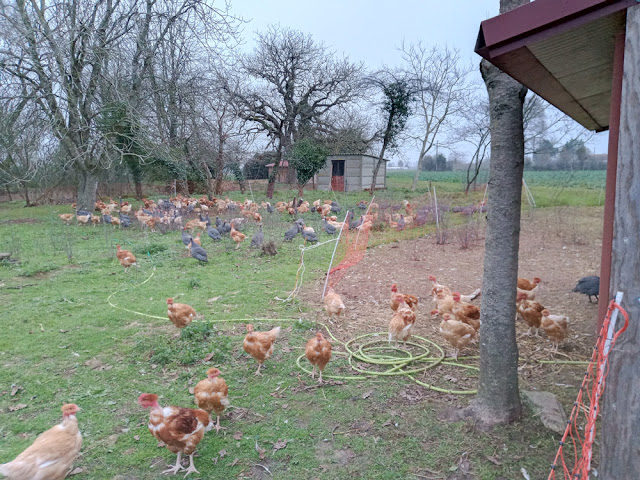 |
| Free range poultry. The poultry houses are on skids and moveable. |
After a session with the organisers from ADEAR 37 (the association for the development of agricultural and rural employment) where all the participants introduced themselves and said why they had come, we went on a brief tour of the farm and Benoit talked about how he managed the work and the animal husbandry.
Then we went to Lieutopie, the volunteer run community space on the market place in Preuilly to watch the film L'Installation, made just before the Covid19 lockdown by Agnes Poirier. The film features a remarkable Breton dairy farmer, Jean-Yves Penn, at the point where he is transferring the farm to a young Parisian couple, Audrey and Laurianne. Jean-Yves has farmed Kervily for 30 years, concentrating on developing the pasture and his herd to suit his belief in working with nature. The cows produce only a third of the milk of his neighbours, but it is premium quality. They live outdoors all year round and are carefully rotated through the pasture. Mastering the art of managing pasture is key to managing this farm and making a living, but Audrey and Laurianne are cityslickers with no experience beyond some recent training courses where they discovered they had a real passion for dairy farming and decided to reinvent themselves.
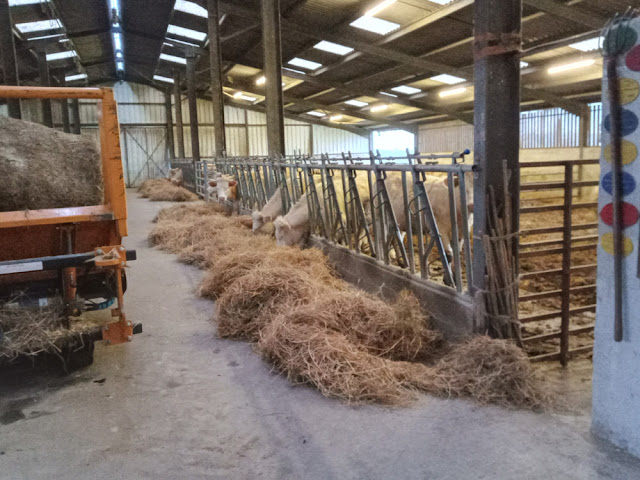 |
| Comfy Charolais heifers munching on homegrown hay (looked like lucerne to me). |
After the film there were questions and comments, most notably from Vincent, a goat dairy farmer who transferred his farm to new owners and retired four years ago. The discussion covered all manner of issues which arise when a farmer wants to retire or a young farmer wants to acquire a farm:
- how to find buyers.
- what is the farm worth?
- who needs to be notified, what administration needs to be done and when?
- how to prepare the farm for sale.
- how to appropriately help the buyer to settle in.
- why sell the farm to a new young farmer rather than sell to the neighbour who wants to enlarge their farm?
- where to advertise the farm.
- do you sell the farm or rent it out?
- developing a plan for retirement.
- what training is available?
There was talk about how difficult dairy farms in particular are to sell because they require a particularly high level of commitment from the farmer, who rarely has a support system which allows them to take a holiday.
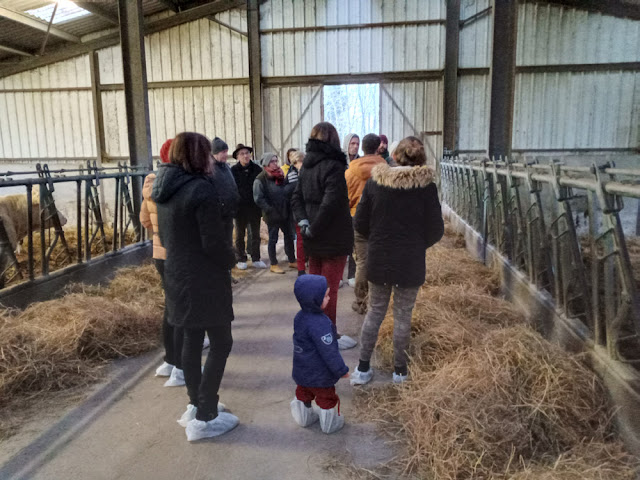 |
| Benoit talking to the group inside the cattle shed. |
Once farmers reach the age of about 55 they start losing the physical strength to continue with animal husbandry, and one solution being seized upon by some is switching from raising animals to growing crops, but it is not always desirable or possible for financial or environmental reasons.
If you are a young farmer, then banks will rarely lend you any money, and even if they do, it won't be sufficient, so other solutions need to be found to fund farm transfers. One such is to sell part of the farm and rent the other part. Partners very often work off farm and although that sometimes allows the farm to survive financially, it means that couples must make compromises for each others work patterns and responsibilities.
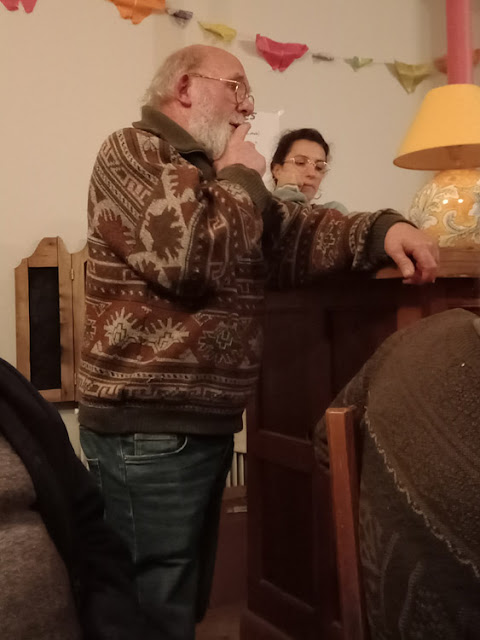 |
| Vincent, looking typically wise and gnomish as he thinks about how best to make his point. |
Vincent spoke very convincingly of the need to start preparing some years before retirement, and to attend a couple of training courses which could help. Farmers shouldn't underestimate what a wrench it will be giving up the farm and their home. Jean-Yves made the point in the film that it is often easier to hand the farm over to strangers than to your children. His father was a farmer, but he moved away, to the next county, and bought his own farm. None of his children wish to take on the farm, and when he retired he moved 50 kilometres -- close enough to be on call if needed, but not so close he is breathing down the new owners necks. He operated in a way that meant he didn't overextend himself financially, to the point he was still using the tractors that had come with the farm thirty years earlier. But for others the solution is to mechanise to the hilt.
The aim of ADEAR 37 is to steer farmers through these very tricky transitions and make sure everyone gets the support they need.
Read more at the France 2 blurb on L'Installation and Agnes Poirier [link].



No comments:
Post a Comment